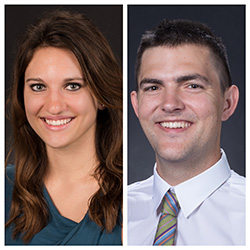New Study Indicates Discouraging Trend
An increasing proportion of all cardiac arrests occurring outside of the hospital are related to drug overdoses, according to a new study conducted by two University of Arizona College of Medicine – Phoenix students.
Fourth-year medical student Gabriella Smith and second-year medical student Sam Beger co-authored a manuscript that revealed about 15 people suffer sudden cardiac arrest every day in Arizona and two of those are related to opioid overdose. This was the first statewide study to show trends in overdose-related out of hospital-cardiac-arrests.

“While much great work has been done across Arizona to combat the opioid problem, overall things have not significantly improved,” Dr. Bobrow said. “The opioid public health problem is not a one and done issue and now there is evidence that opioids are responsible for cardiac arrest, often tragically in very young people. The problem of opioid addiction is a generational problem and requires continuous surveillance, data collection, and strategic implementation of interventions to reduce opioid related deaths.”
As of Dec. 6, 2018, the Arizona Department of Health Services reported more than 16,800 suspected opioid overdoses and 2,500 opioid deaths. In recent news, the CDC released new data suggesting that drug overdose deaths in the US were so high in 2017 that it contributed to a drop in overall life expectancy.
“I worked in the emergency department for three years before medical school, where I saw a lot of young individuals coming in who were victims of overdose,” Beger said. “This issue is extremely important and is a national crisis. Working with the Arizona Emergency Medicine Research Center, we are using the results of our study to work on interventions to reverse these concerning regional trends.”
Although the opioid overdose mortality has increased in the US over the years, the recent regional trends in the proportion of treated overdose-related out-of-hospital cardiac arrests compared to out-of-hospital cardiac arrests of presumed cardiac etiology are largely unknown.
The group analyzed data from 2010 to 2015 from an out-of-hospital cardiac arrest registry gathered by the Arizona Department of Health Service, and looked at hospital data to determine the most likely cause of cardiac arrest — whether it was due to a primary cardiac problem like a heart attack or another problem like drug overdose.
They believe this research warrants increases and continuous public health focus and resources directed to continuous cardiac arrest and opioid surveillance; prevention and effective treatment strategies such as increased public awareness and recognition of opioid overdose; and proficiency in bystander CPR, along with widespread access to the opioid reversal agent naloxone.
“This research was important to us because of its enormous impact on the community and our patients. The opioid epidemic is an issue not only seen in Arizona, but across the nation,” Smith said. “Research like this will make us better clinicians and lead to better outcomes for our patients. Really, that’s why we are all here — to improve patient care and save lives.”
About the College
Founded in 2007, the University of Arizona College of Medicine – Phoenix inspires and trains exemplary physicians, scientists and leaders to advance its core missions in education, research, clinical care and service to communities across Arizona. The college’s strength lies in our collaborations and partnerships with clinical affiliates, community organizations and industry sponsors. With our primary affiliate, Banner Health, we are recognized as the premier academic medical center in Phoenix. As an anchor institution of the Phoenix Bioscience Core, the college is home to signature research programs in neurosciences, cardiopulmonary diseases, immunology, informatics and metabolism. These focus areas uniquely position us to drive biomedical research and bolster economic development in the region.
As an urban institution with strong roots in rural and tribal health, the college has graduated more than 1,000 physicians and matriculates 130 students each year. Greater than 60% of matriculating students are from Arizona and many continue training at our GME sponsored residency programs, ultimately pursuing local academic and community-based opportunities. While our traditional four-year program continues to thrive, we will launch our recently approved accelerated three-year medical student curriculum with exclusive focus on primary care. This program is designed to further enhance workforce retention needs across Arizona.
The college has embarked on our strategic plan for 2025 to 2030. Learn more.